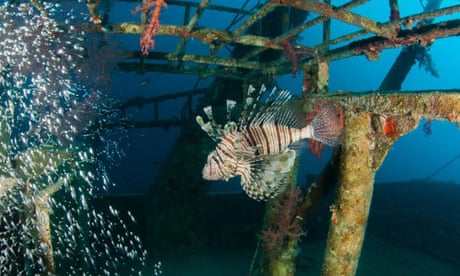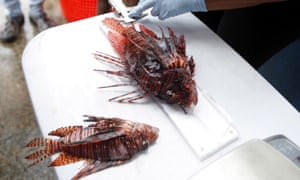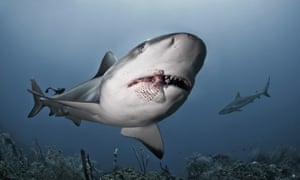Cyprus begins lionfish cull to tackle threat to Mediterranean ecosystem
By Helena Smith from the Guardian UK

Voracious fish are bleeding into ocean ‘like a cut artery’, says top marine biologist
Cyprus has held its first organised cull of lionfish after numbers of the invasive species have proliferated in recent years, threatening the Mediterranean ecosystem and posing a venomous danger to humans.
“They’re actually very placid,” said Prof Jason Hall-Spencer, a marine biologist, after spearing 16 of the exotic specimens in the space of 40 minutes in the inaugural “lionfish removal derby” off the island’s southern coast. He added: “The problem is they are not part of the natural ecosystem and we are seeing them in plague proportions.”


Invasive lionfish have reached the Mediterranean. Luckily they’re tasty …
Hall-Spencer, of the University of Plymouth, regards the ornamental species as the single biggest threat to the biodiversity of the region.
“I can’t overstate how serious a problem this is for the whole of the Mediterranean,” he said, emphasising the risk of habitat destruction and species extinction. “Lionfish are the most damaging invasive fish we have ever seen. If action isn’t taken there will be lasting environmental and economic damage.”
Lionfish, armed with venomous dorsal spines that enable them to deter predators, are more normally associated with warm tropical waters of the South Pacific and Indian Ocean. Almost two decades ago the non-native tropical fish began to enter US waters, appearing in the Atlantic after pet owners started releasing outsized lionfish from home aquariums into the sea.
Now they have reached Europe. In 2012, after initial sightings off Turkey, Israel and Lebanon, they were spotted off Cyprus. Three years later they had appeared further south in Greece, Italy and Tunisia, testimony, scientists say, to their ability to both enter new territories and spawn at record rates.


As numbers proliferate, so have fears of the flamboyantly coloured fish posing the biggest ecological setback to ecosystems in the Mediterranean – which is already under pressure from pollution, tourism and over-exploitation. In the EU, Cyprus has become “the first line of defence” against the lionfish invasion.
With mounting evidence of the species’ capacity to outcompete other fish, the Cypriot government has increasingly come round to the idea of organised culls – acknowledging that if the pest is not brought under control lionfish will have an effect on commercial fishing.
Nicholas Michaelides, of the fisheries and marine research department in Nicosia, said: “If culls prove to be an effective tool in managing this problem we will apply it for sure. It is illegal in Cyprus to hunt using scuba diving equipment but in this case we are permitting it. We can’t say we’re not worried.”
On an island dependent on tourism, the department is taking measures to inform the public ahead of summer. Although there have been no known fatalities caused by lionfish stings, human contact with the venom is horribly painful as fishermen have discovered pulling catches from nets.
The first cull was held in a marine protected area off Cape Greco on Sunday, with prizes handed out for harpooning the smallest and largest fish.
“The plan is for similar culls to take place twice a month over the next two years,” said Periklis Kleitou, a research fellow at the University of Plymouth, which is helping to coordinate the removal project. “We’re keen to encourage local fishermen and divers to get involved [in the hunt].”
Lionfish, he said, not only had no natural enemies, laboratory dissections had proved they were also furnished with ferocious appetites. “They eat everything. Culling this invasive species is the only effective way to reduce their numbers and ensure marine-protected areas continue to regenerate.”
In addition to removal action teams, surveillance platforms to monitor lionfish were being developed as part of the EU-funded programme. Kleitou said: “This is a regional problem and our insights and knowledge will be transferred and replicated in surrounding countries.”
Global warming and the rise in sea temperatures have encouraged the invasion.
A report compiled by the Limassol-based Marine & Environment Research Lab with Hall-Spencer, noted that the Indo-Pacific species had colonised almost the entire south-east coast of Cyprus “within a year … assisted by sea surface warming.”
But scientists believe expansion works to the Suez Canal have also played a role, by enabling the toxic fish to migrate from native habitats in the Red Sea. The canal, which is one of the world’s most important waterways, was widened and deepened to cater for ever-bigger container ships only three years ago.Advertisement
“That may have saved time and money but to do it without any biosecurity measures in place was mad,” Hall-Spencer said. “The oceans are bleeding invasive and damaging species into the Mediterranean like a cut artery.”


Lionfish were by far the greatest offenders with the highest impact on marine ecology because they are such voracious and adept predators.Advertisement
Environmental watchdogs have said invasive species are now among the top five leading causes of biodiversity loss globally. In the western Atlantic lionfish have been linked to the reduction of coral reef fish by about 65%.
Culls have proved highly effective in the Caribbean where the species has been blamed for destruction of coral reefs, diminishing populations of other fish and vast ecological damage.
“In these waters I think we may have missed the chance to eradicate them completely because they will spread as the seas warm,” Hall-Spencer said.
But, he cautioned, all is not lost. There is still time to control the population especially in marine-protected areas. And even better lionfish could be good business.”
“In all of this there is a silver lining,” he joked. “As firm-fleshed fish they taste absolutely wonderful. There’s definitely a niche market to be had putting lionfish on dinner tables.”
As the crisis escalates…
… in our natural world, we refuse to turn away from the climate catastrophe and species extinction. For The Guardian, reporting on the environment is a priority. We give reporting on climate, nature and pollution the prominence it deserves, stories which often go unreported by others in the media. At this pivotal time for our species and our planet, we are determined to inform readers about threats, consequences and solutions based on scientific facts, not political prejudice or business interests. But we need your support to grow our coverage, to travel to the remote frontlines of change and to cover vital conferences that affect us all.
More people are reading and supporting our independent, investigative reporting than ever before. And unlike many news organisations, we have chosen an approach that allows us to keep our journalism accessible to all, regardless of where they live or what they can afford.
The Guardian is editorially independent, meaning we set our own agenda. Our journalism is free from commercial bias and not influenced by billionaire owners, politicians or shareholders. No one edits our editor. No one steers our opinion. This is important as it enables us to give a voice to those less heard, challenge the powerful and hold them to account. It’s what makes us different to so many others in the media, at a time when factual, honest reporting is critical.
Every contribution we receive from readers like you, big or small, goes directly into funding our journalism. This support enables us to keep working as we do – but we must maintain and build on it for every year to come.
Support The Guardian from as little as $1 – and it only takes a minute. Thank you.
For more on this story and to donate go to; https://www.theguardian.com/environment/2019/may/29/cyprus-begins-lionfish-cull-to-tackle-threat-to-mediterranean-ecosystem





